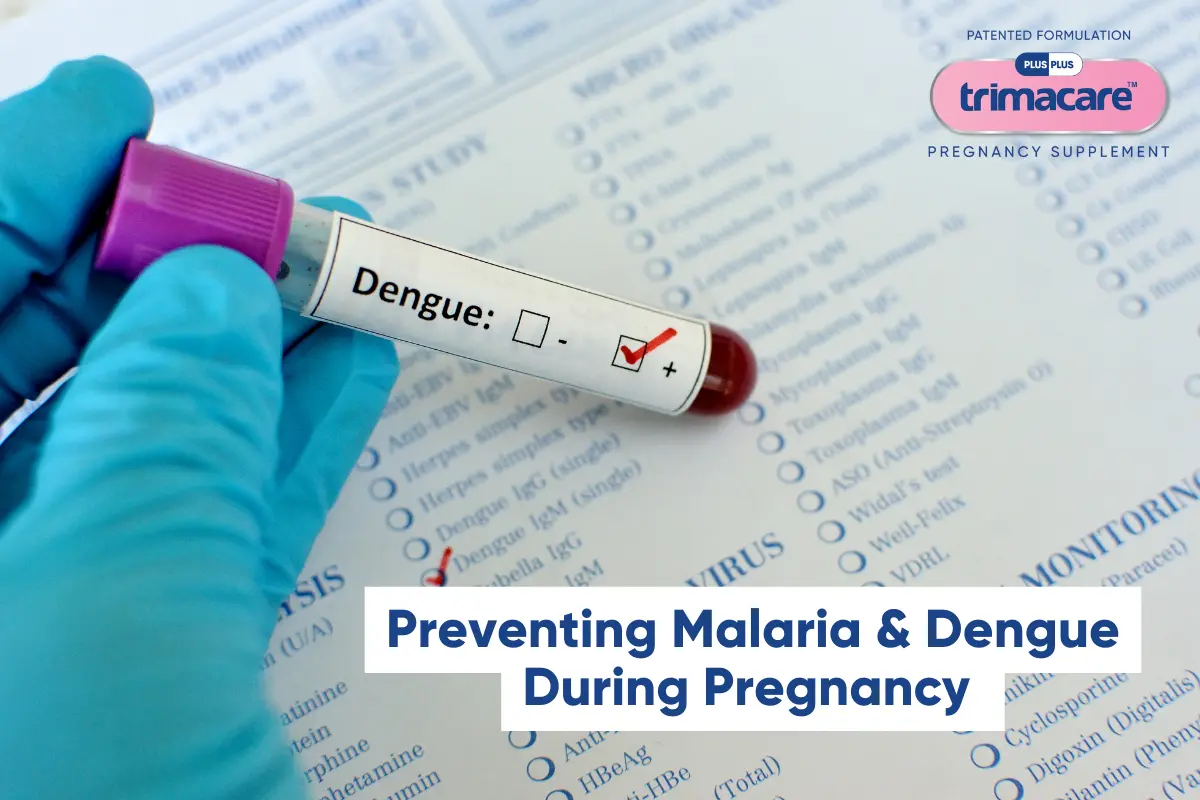Pregnant women who get dengue are at risk of haemorrhaging in the mother and the foetus. Moreover, there is a great risk of preterm birth and foetal death. If the infection occurs just before delivery, there is a possibility of vertical transmission.
Malaria during pregnancy and dengue during pregnancy can also lead to congenital infections, miscarriage, and other complications. Pregnant women who are infected with malaria can also face anaemia, convulsions, and kidney damage. However, if the treatment is not administered appropriately, fevers like dengue and malaria can be dangerous to a pregnant woman.
Are you getting the right nutrition to fight malaria and dengue during pregnancy?
Prenatal vitamins contain essential nutrients that help improve your immunity and strengthen your body during pregnancy while helping you fight infections of malaria and dengue.
Trimacare multivitamin tablets contain various nutrients that support maternal well-being and supports healthy immune system. Trimacare 1, 2, and 3 prenatal multivitamins contain Vitamin C, zinc, Vitamin B12, and iron. Vitamin C strengthens the immune system; B12 strengthens energy, and mood, and reduces stress. Iron is available in Trimacare 2 and 3 multivitamin tablets for haemoglobin synthesis and oxygen transportation for decreased maternal fatigue.
Causes of Malaria and Dengue During Pregnancy
The causes of malaria in pregnancy and dengue during pregnancy include:
- Mosquito Bites: This form of malaria parasite can infect people through the bites of infected mosquitoes.
- Travelling: While travelling during pregnancy, you need to avoid going to places more prone to malaria and dengue.
- Transfusion of blood: Malaria and dengue can be caused by blood transfusions or products made from contaminated blood.
- Onset of illness: The infected pregnant female may start showing signs and symptoms of dengue during pregnancy after incubating for 4-10 days.
EFFECTS OF MALARIA IN PREGNANCY
Malaria and dengue infections during pregnancy can significantly affect both the mother and the developing foetus, which may lead to several complications:
Anaemia: Malaria in pregnancy can cause severe anaemia in pregnant women, leading to weakness, fatigue, and an increased risk of complications during childbirth.
Pregnant women are at a higher risk of severe forms of malaria and dengue, such as cerebral malaria, which can lead to seizures, coma, or death if left untreated.
Organs Failure: Pregnancy-induced malaria can cause severe organ failure, potentially affecting the kidneys, liver, or lungs. Pregnancy-induced malaria can lead to severe organ failure affecting the kidneys, liver, or lungs.
Miscarriage and Stillbirth: Malaria in pregnancy increases the risk of miscarriage, stillbirth, and premature delivery.
Low Birth Weight: Pregnant mothers infected with malaria during pregnancy and dengue during pregnancy are at an increased risk of low birth weight, which again, may vary in its critical outcomes regarding the newborn’s health.
Congenital Malaria: Malaria parasites can cross the placenta, infecting the foetus and causing congenital malaria, with fever and other complications in newborn babies. Malaria during pregnancy increases the chances of miscarriage, stillbirth, and premature delivery.
Effects of Dengue During Pregnancy:
Severe changes in Immune system: Pregnant women with dengue may experience more severe symptoms due to immune system changes during pregnancy.
Haemorrhagic Fever: Pregnancy and Dengue may cause severe dengue haemorrhagic fever or dengue shock syndrome characterized by bleeding, low platelet count, and shock.
Preterm Birth: Dengue during pregnancy increases the risk of preterm birth, exposing the baby to potential health risks linked to premature delivery.
Low Birth Weight: Pregnant mothers who contracted dengue during pregnancy may have a higher chance of having babies with low birth weight.
Pregnant women should seek immediate medical attention for malaria, pregnancy, and dengue infections, avoid mosquito bites, use protective clothing, and seek advice before travelling to endemic areas.
PREVENTING DENGUE AND MALARIA INFECTIONS DURING PREGNANCY
Preventing dengue and malaria illnesses during pregnancy is extremely essential to the health of the pregnant woman and the unborn child. Here are some ways to prevent dengue and malaria:
- To prevent dengue during pregnancy, use mosquito repellent creams, applied no more than three times daily, with protection duration varying by brand. Use repellents that have higher concentrations providing longer protection.
- During mosquito season, sleep in air-conditioned rooms with mosquito nets, wear long sleeves and pants, and light-coloured clothing to reduce exposure to mosquitoes and repel them. Wearing less exposed skin and light-coloured clothing can also help.
- To prevent dengue and malaria mosquitoes from entering your home, use cleaning solutions and deterrents like electronic vaporisers, citronella or lemongrass drops in water, insecticide-treated bed nets, and sealed windows.
- Regularly check and eliminate sources of standing water around your home, as stagnant water serves as a breeding ground for mosquitoes.
- Avoid travelling to areas that are heavily infested with dengue during pregnancy and malaria during pregnancy if possible.
- Personal hygiene is most important during pregnancy. One should maintain good personal hygiene during pregnancy by washing hands with soap and water.
TRIMACARE PREGNANCY VITAMIN SUPPLEMENT: IDEAL IMMUNITY BOOSTER DURING PREGNANCY
Trimacare prenatal vitamins in India is an all-natural, one-pill solution designed for every trimester of pregnancy, so it provides comprehensive nutrition that supports the mother and child.
The following nutrients in Trimacare multivitamin tablets vitamins C, iron, zinc, and vitamin B12-help the immune system as well as the general health of the pregnant mother. In fact, vitamin B12 is said to raise mood, energy, and stress levels, while vitamin C does strengthen immunity. Vitamin C, zinc, vitamin B12 in Trimacare Prenatal Multivitamins support wound healing, tissue repair, and the proper development of your baby’s teeth and bones.
Iron is incorporated in Trimacare 2 and 3 multivitamin tablets. It prevents fatigue in mothers by stimulating the production of haemoglobin and its ability to carry oxygen. Trimacare prenatal tablets contain Vitamin C, which is necessary for the mother and the foetus during pregnancy.
Frequently Asked Questions:
- In what ways a pregnant woman can prevent dengue and malaria?
Pregnant women can prevent dengue and manage fever diseases by using mosquito repellent, wearing long-sleeved clothing, staying indoors during peak mosquito movement times, and sleeping under bed nets that have been treated with mosquito spray.
- What precautions a pregnant mother should take while travelling to mosquito prevalent places?
Generally, pregnant women are not advised to visit areas where dengue and malaria are prevalent as their chances of getting infected are relatively higher. However, if travel is unavoidable, pregnant women should take adequate precautions such as using repellents, wearing protective clothes, and staying in rooms with screened windows and doors.
- What should pregnant women do if they suspect that they have been exposed to dengue or malaria?
Pregnant women should seek medical attention as soon as they suspect exposure to dengue or jungle fever. This helps in making prompt diagnoses and treatments to ward off complications both on the mother’s and foetal sides.
- What medications, if any, may pregnant women use to help prevent dengue and malaria?
Pregnant women should discuss their taking any medication with their care provider to avoid dengue and malaria. They will sometimes be placed on an antimalarial drug, which should be done only after considerable weighing of risks and benefits for both mother and unborn child.
A Certified Nutritionist with a rich healthcare background in health journalism, the author has immense experience in curating reader-friendly, engaging, and informative healthcare blogs to empower readers to make informed pregnancy-related decisions.












